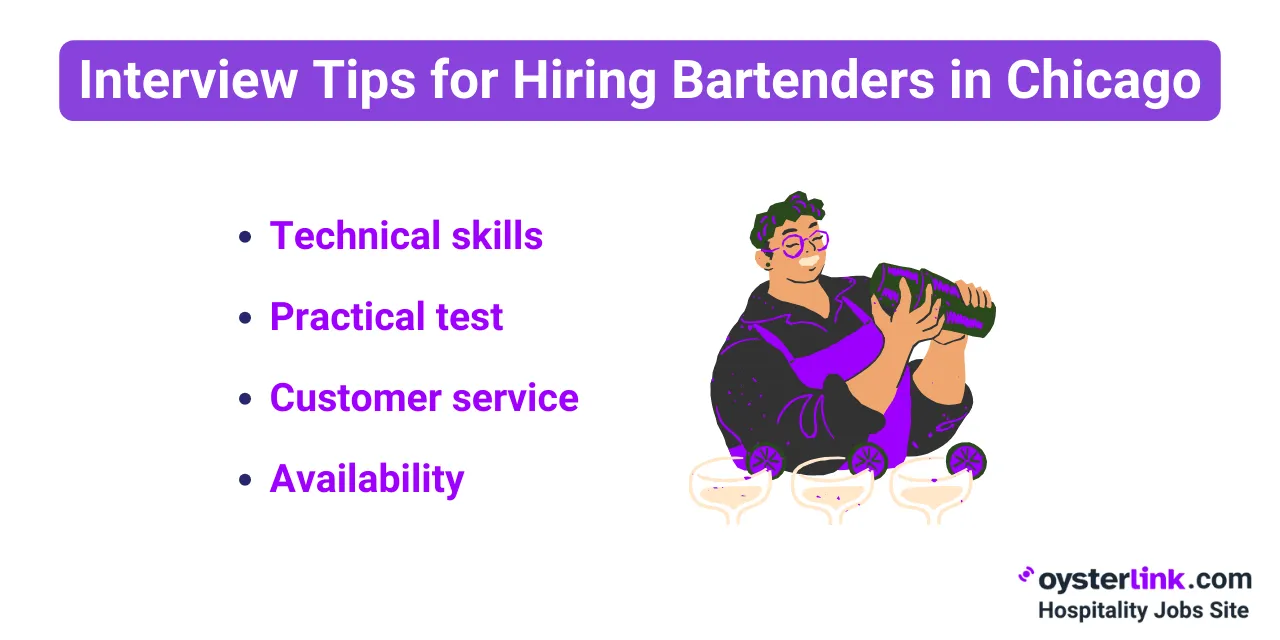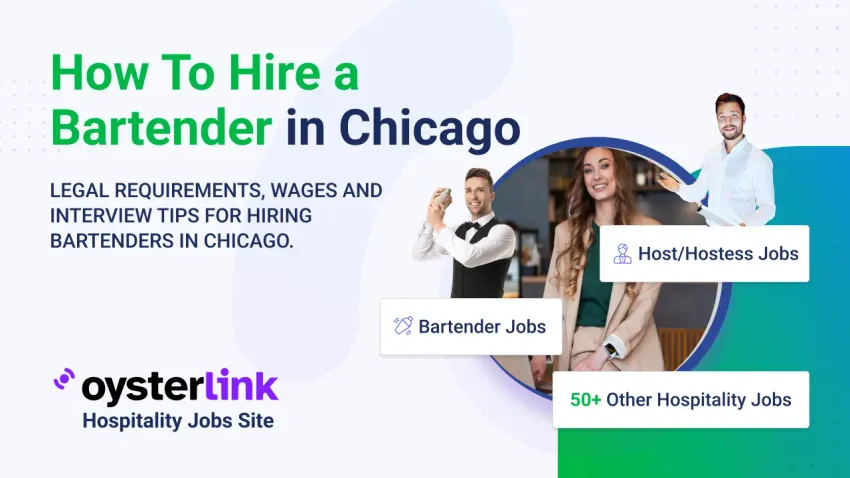Hiring a Bartender in Chicago involves meeting legal requirements, offering competitive wages and conducting thorough interviews. Understanding these elements ensures you find a skilled, certified professional who fits your establishment’s needs.
Restaurant owners in Chicago can rely on resources like restaurants hiring Chicago to streamline their Bartender hiring.
Legal Requirements for Hiring a Bartender in Chicago
When hiring a Bartender in Chicago, you must comply with several important legal requirements designed to promote responsible alcohol service and workplace safety.
BASSET Certification Requirement
Illinois law mandates bartenders obtain BASSET (Beverage Alcohol Sellers and Servers Education and Training) certification. This program trains bartenders to serve alcohol responsibly, recognize signs of intoxication, and understand state liquor laws.
Employers should verify that candidates possess a current BASSET certification before hiring.
A TikTok video from a Bartender’s perspective highlights how BASSET training directly affects real-world service decisions, including when to refuse service and how to handle difficult situations. While the content reflects an employee experience, it reinforces why employers must require certification to protect their business, maintain compliance and reduce liability.
Learn more about the importance of Bartender health and safety to ensure compliance and safe service.
Minimum Age and Food Handling Licenses
The legal age to serve alcohol in Illinois is 18 years old. Additionally, Bartenders who also serve food may be required to hold a food handler's license, depending on your establishment’s policies and local regulations.
Checking these credentials ensures compliance and avoids potential fines.
Explore how to hire a Kitchen Manager if your establishment needs help managing food service alongside bartending tasks.
Wages and Compensation for Bartenders in Chicago
Chicago sets specific wage standards for tipped employees like Bartenders. Understanding these is critical for budgeting and attracting qualified candidates.
Minimum Wage and Tip Credit
Starting August 2025, Chicago's minimum wage for all workers is $15.00 per hour. For tipped positions such as Bartenders, employers must pay a minimum cash wage of $9.00 per hour. Tips must raise the total hourly earnings to at least $15.00.
If tips do not reach this minimum, employers are required to compensate the difference.
Average Earnings for Bartenders in Chicago
On average, Bartenders in Chicago earn between $20 to $30 per hour when combining base wages and tips. These earnings vary based on experience, establishment prestige and peak operating hours.
A TikTok video from a Bartender in Chicago sharing her weekly income offers a real-world view of how tips and scheduling affect take-home pay.
While the video is told from an employee perspective, it helps employers understand how compensation structures influence recruitment, scheduling priorities and long-term retention.
Offering competitive wages and strong tip-earning opportunities helps retain skilled bartenders who contribute to excellent customer experiences.
For managers looking to understand compensation better, reviewing the Bar Manager salary overview can provide valuable context.
Interview Tips for Hiring Bartenders in Chicago
Conducting effective interviews allows you to identify candidates who excel in technical skills, customer service and adaptability.
Assessing Experience and Technical Skills
Ask candidates about their previous bartending experience and familiarity with popular drink recipes. Inquire about their ability to handle high-volume shifts.
Including a practical test where candidates prepare cocktails can demonstrate their efficiency, accuracy and speed behind the bar.
Check out tips on how to interview bartenders for in-depth advice on assessment strategies.
Evaluating Customer Service and Situational Judgment
Assess the applicant’s customer service skills by discussing how they handle difficult situations, such as managing intoxicated patrons or coping with multiple orders. Their approach to conflict resolution reveals critical interpersonal abilities.
Some excellent insights on handling difficult customers can enhance your evaluation process.
Flexibility and Availability
Because bars tend to be busiest in evenings, weekends and holidays, understanding candidates' availability for these peak hours is essential.
Hiring flexible staff reduces scheduling conflicts and ensures smooth operations.

Additional Considerations for Hiring a Chicago Bartender
Beyond basics, consider how well candidates align with your establishment’s culture and customer base.
Soft skills like communication and teamwork often determine long-term success and positive workplace dynamics.
Verifying Certifications and Backgrounds
Always confirm that Bartenders hold valid BASSET certification and any necessary food-handling licenses.
Conduct background checks as permitted to ensure reliable and trustworthy hires.
Learn about best practices in background checks for restaurants to safeguard your hiring decisions.
Useful Official Resources for Hiring Bartenders in Chicago
- For detailed alcohol laws and BASSET certification information, visit the Illinois Liquor Control Commission.
- Consult the City of Chicago Minimum Wage Ordinance to stay updated on wage requirements.
- For food handler licensing and training, check the Illinois Department of Public Health Food Handler Training.
How To Hire a Bartender in Chicago: Conclusion
Hiring a bartender in Chicago necessitates understanding legal certifications, wage laws, and effective interview strategies.
Ensuring candidates have BASSET certification, offering competitive wages aligned with the city's minimums, and assessing skills through targeted interview questions will help you secure qualified and reliable bartenders for your establishment.
Additional insights on hiring bartenders that customers love can elevate your hiring approach and business success.









Loading comments...